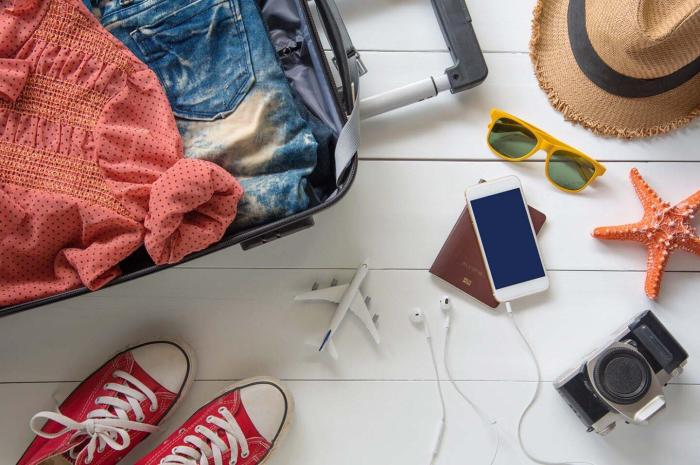
Embark on an exciting journey with How to travel on a student budget, where we uncover the secrets to exploring the world without breaking the bank. Get ready to pack your bags and your wallet for an adventure of a lifetime!
Are you tired of dreaming of exotic destinations but held back by your student budget? Well, worry no more! We’ve got you covered with all the essential tips and tricks to make your travel dreams a reality without burning a hole in your pocket.
Overview of Student Travel on a Budget
Traveling as a student can be an incredibly enriching experience, allowing you to explore new cultures, meet new people, and broaden your horizons. However, as a student, it’s essential to be mindful of your budget to make the most of your travel opportunities.
Importance of Budgeting for Students
Budgeting is crucial for students because it helps you manage your finances efficiently and ensures that you can make the most of your travel experiences without overspending. By setting a budget for your trips, you can prioritize your expenses and allocate funds for transportation, accommodation, food, and activities.
General Tips for Saving Money During Travel
- Book flights and accommodations in advance to take advantage of early bird discounts.
- Opt for budget accommodations like hostels, Airbnb, or student dormitories.
- Use student discounts whenever possible for attractions, transportation, and dining.
- Cook your meals or eat street food to save on dining expenses.
- Explore free or low-cost activities such as walking tours, hiking, or visiting museums on designated free entry days.
Benefits of Traveling on a Student Budget
- Develop financial discipline and money management skills that will be beneficial in the long run.
- Experience a destination authentically by interacting with locals and immersing yourself in the culture.
- Build lasting memories and friendships through shared travel experiences with fellow students or like-minded travelers.
- Gain a deeper appreciation for the value of money and the importance of responsible spending.
Accommodation Options
When traveling on a student budget, finding affordable accommodation is crucial to keeping costs down. There are various options available for budget-friendly stays, each with its own pros and cons.
Hostels
Hostels are a popular choice for budget travelers, offering shared dormitory rooms at lower prices compared to hotels. They are great for meeting other travelers and usually provide communal spaces for socializing. However, privacy can be limited, and amenities may vary from hostel to hostel.
Airbnb
Airbnb allows travelers to rent accommodations from local hosts, ranging from shared rooms to entire apartments or houses. This option can sometimes be cheaper than hotels and offer a more authentic experience. However, availability may be limited in some areas, and additional fees can increase the overall cost.
Couchsurfing
Couchsurfing is a platform where travelers can stay with locals for free. It’s a great way to immerse yourself in the local culture and make new friends. However, safety concerns may arise when staying with strangers, so it’s essential to research hosts thoroughly and communicate clearly.
Finding Affordable Lodging Strategies
When looking for budget accommodations, consider booking in advance to secure lower rates. Flexibility with travel dates can also help you find better deals. Additionally, signing up for loyalty programs or using student discounts can further reduce costs. Be open to different types of accommodation to find the best option for your budget.
Safety Tips for Staying in Budget Accommodations
Regardless of the type of budget accommodation you choose, safety should always be a top priority. Always lock your belongings and use secure lockers when available. Trust your instincts and avoid risky situations. Research the neighborhood before booking to ensure it’s safe for travelers. Lastly, inform someone of your whereabouts and check-in regularly to stay safe during your stay.
Transportation Tips

When traveling on a student budget, finding affordable transportation options is key to saving money and making the most of your trip. Here are some tips to help you navigate transportation on a budget.
Budget-Friendly Transportation Options
- Public Transport: Utilizing buses, subways, and trams in your destination city can be a cost-effective way to get around. Look for discounted student passes or travel cards for additional savings.
- Ridesharing: Services like Uber, Lyft, or local ridesharing apps can be convenient and sometimes cheaper than traditional taxis. Splitting the cost with other travelers can further reduce expenses.
- Walking: Whenever possible, opt to explore your destination on foot. Walking not only saves money but also allows you to immerse yourself in the local culture and discover hidden gems along the way.
Pros and Cons of Each Transportation Mode
| Transportation Mode | Pros | Cons |
|---|---|---|
| Public Transport | Cost-effective, often well-connected | May be crowded or have limited operating hours |
| Ridesharing | Convenient, door-to-door service | Cost can vary depending on demand |
| Walking | Free, great for exploring small areas | Not suitable for long distances or inclement weather |
Tips for Booking Cheap Flights and Trains
- Be Flexible: Try adjusting your travel dates to find lower fares, as midweek flights and off-peak times are often cheaper.
- Set Price Alerts: Use travel websites or apps to monitor price changes and snag deals when prices drop.
- Consider Budget Airlines: Look beyond traditional carriers and explore budget airlines for discounted fares, but be aware of additional fees for baggage or amenities.
- Book in Advance: Securing your tickets early can sometimes result in lower prices, especially for train journeys.
Food and Dining
When traveling on a student budget, it’s essential to find ways to save money on meals without compromising on the experience of trying local cuisine. By strategically planning your dining options, you can enjoy delicious food while staying within your budget.
Ways to Save Money on Meals
- Avoid eating in touristy areas where prices tend to be higher. Explore local neighborhoods for more budget-friendly options.
- Look for street food markets or food trucks that offer affordable and tasty meals.
- Consider cooking some of your meals if your accommodation allows it. Visit local markets to buy fresh ingredients and prepare simple dishes.
- Take advantage of student discounts at restaurants or look for special meal deals during off-peak hours.
Finding Affordable Local Eateries
- Ask locals or check online forums for recommendations on hidden gems where you can enjoy authentic local food at reasonable prices.
- Look for small family-run restaurants or cafes that often offer better value for money compared to larger establishments.
- Consider sharing meals with travel companions to split the cost and try a variety of dishes without overspending.
- Opt for lunch specials or set menus that are usually more affordable than ordering à la carte.
Importance of Budgeting for Food Expenses
- Setting a daily food budget can help you track your expenses and avoid overspending on meals.
- Allocate more budget for dining experiences you don’t want to miss out on, but balance it with more budget-friendly options to stay within your overall budget.
- By planning ahead and researching affordable dining options, you can enjoy a variety of local cuisines without breaking the bank.
Activities and Sightseeing

When traveling on a student budget, it’s essential to find activities and sightseeing opportunities that are affordable or even free. Engaging in cultural experiences can enrich your travel experience without breaking the bank. Here are some tips to help you make the most of your trip without overspending.
Low-Cost or Free Activities
- Explore local parks, markets, and neighborhoods to get a feel for the culture without spending much.
- Visit museums or historical sites on free admission days or look for student discounts.
- Take advantage of walking tours or self-guided tours to discover the city on foot.
- Attend local events, festivals, or concerts that offer entertainment at little to no cost.
Cultural Experiences on a Budget
- Immerse yourself in the local culture by trying traditional foods at budget-friendly eateries.
- Participate in cultural workshops or classes to learn about local crafts or traditions.
- Interact with locals through community events or volunteer opportunities for a deeper cultural experience.
Prioritizing Activities
- Make a list of must-see attractions and prioritize them based on your interests.
- Consider combining activities or sights in the same area to save time and transportation costs.
- Look for combo tickets or city passes that offer discounts on multiple attractions.
Family Travel
Planning a budget-friendly family trip can be challenging, but with the right strategies, it is definitely possible. Finding family-friendly accommodations, activities, and managing expenses are all crucial aspects to consider when traveling with children.
Budget-Friendly Family Trips
When planning a family trip on a budget, consider destinations that offer free or discounted activities for children. Look for all-inclusive packages that include meals and entertainment to save money. Additionally, traveling during off-peak seasons can help you secure better deals on accommodations and transportation.
Family-Friendly Accommodations and Activities
Look for accommodations that cater to families, such as hotels with family suites, kitchenettes, and complimentary breakfast. Consider staying in vacation rentals or Airbnb properties for more space and flexibility. When it comes to activities, opt for attractions that offer discounts for families or have free admission for children.
Managing Expenses with Children
Set a budget for your family trip and stick to it by tracking your expenses throughout the journey. Pack snacks and drinks to avoid unnecessary spending on food while on the go. Take advantage of kids’ menus at restaurants and look for dining deals that offer discounts for families. Consider using public transportation or renting a car to save on transportation costs.
Couples Travel
Traveling as a couple can be a wonderful experience, but it doesn’t have to break the bank. With some smart planning and budget-saving tips, you can enjoy romantic getaways without overspending. Here are some ideas to help you make the most of your couple travels on a budget.
Budget-saving Tips for Couples Traveling Together
- Consider traveling during the off-peak season to take advantage of lower prices on accommodations and activities.
- Look for deals and discounts on travel packages, flights, and accommodations specifically tailored for couples.
- Opt for shared accommodations like Airbnb or hostels to save on lodging costs.
- Plan and book activities in advance to secure lower prices and avoid last-minute expenses.
- Pack light to avoid excess baggage fees and save on transportation costs.
Romantic yet Affordable Travel Destinations
- Explore the charming streets of Prague, known for its fairytale architecture and romantic ambiance.
- Enjoy the crystal-clear waters and stunning sunsets in Santorini, Greece, without breaking the bank.
- Visit the historic city of Budapest, Hungary, where you can soak in thermal baths and enjoy budget-friendly gourmet dining.
Ideas for Planning Budget-friendly Couple Activities
- Take a romantic stroll along the beach during sunset or have a picnic in a local park.
- Visit local markets and try street food together to experience the culture without spending a lot.
- Embark on a hike or bike ride to explore nature and enjoy each other’s company without additional costs.
Business Travel
When it comes to traveling for business as a student, it is essential to find ways to do so on a budget. Here, we will explore some tips on how students can manage their business travel expenses effectively.
Cost-Effective Accommodations and Flights
Booking cost-effective accommodations and flights is crucial for students traveling for business purposes. Here are some tips to help you save money:
- Look for student discounts: Many hotels and airlines offer discounts specifically for students, so be sure to take advantage of these deals.
- Consider alternative accommodations: Instead of traditional hotels, look into hostels, Airbnb, or budget-friendly options to save on lodging costs.
- Be flexible with your travel dates: By being open to traveling on weekdays or during off-peak times, you can often find cheaper flight and hotel options.
- Utilize reward programs: Sign up for loyalty programs with airlines and hotels to earn points that can be redeemed for future travel.
Balancing Work and Leisure
While traveling for business, it is essential to find a balance between work and leisure, even on a budget. Here are some ways to make the most of your trip:
- Schedule downtime: Allocate some time in your itinerary to explore the destination and relax, ensuring you don’t burn out from work-related activities.
- Combine work and leisure activities: Look for opportunities to mix business meetings with sightseeing or cultural experiences to make the most of your trip.
- Set a budget: Plan your expenses in advance to ensure you have enough funds for both work-related costs and leisure activities during your trip.
- Take advantage of free attractions: Research free attractions or activities in the destination to enjoy your time without breaking the bank.
Digital Nomad Travel
Traveling as a digital nomad offers students the opportunity to combine work and exploration, all while sticking to a budget. This lifestyle allows individuals to work remotely from anywhere in the world, making it an appealing option for students seeking adventure without compromising their studies or job responsibilities.
Budget-Friendly Destinations for Digital Nomads
- Bali, Indonesia: Known for its affordable cost of living, stunning landscapes, and vibrant culture, Bali is a popular choice for digital nomads on a budget.
- Chiang Mai, Thailand: With its low cost of living, delicious street food, and thriving digital nomad community, Chiang Mai is a top destination for budget-conscious travelers.
- Lisbon, Portugal: Offering a mix of history, culture, and modern amenities, Lisbon provides a charming backdrop for digital nomads looking to save money while enjoying a European experience.
Tips for Managing Work Responsibilities While Traveling on a Budget
- Establish a routine: Set specific work hours and create a dedicated workspace to stay productive while traveling.
- Utilize time management tools: Use apps or software to track your tasks, deadlines, and schedules to ensure you stay on top of your work responsibilities.
- Communicate effectively: Keep in touch with your clients or team members to provide updates on your progress and availability, maintaining clear communication channels at all times.
Summary
As we reach the end of our budget-savvy travel guide, remember that with a little creativity and planning, you can jet set around the globe without draining your bank account. So, pack light, keep those travel goals high, and let your student budget take you places you’ve only imagined!
Essential FAQs
Can students really travel on a tight budget?
Absolutely! With the right strategies and mindset, students can explore the world without spending a fortune. From budget accommodations to affordable transportation, there are plenty of ways to make it work.
Is it safe to stay in budget-friendly accommodations?
While budget accommodations like hostels and Airbnb can be safe options, it’s always important to research and read reviews before booking. Use common sense and trust your instincts when choosing where to stay.
How can I save money on food while traveling?
Look for local eateries, opt for street food, and consider cooking some meals yourself if possible. Eating where the locals eat is not only budget-friendly but also a great way to experience the culture.





